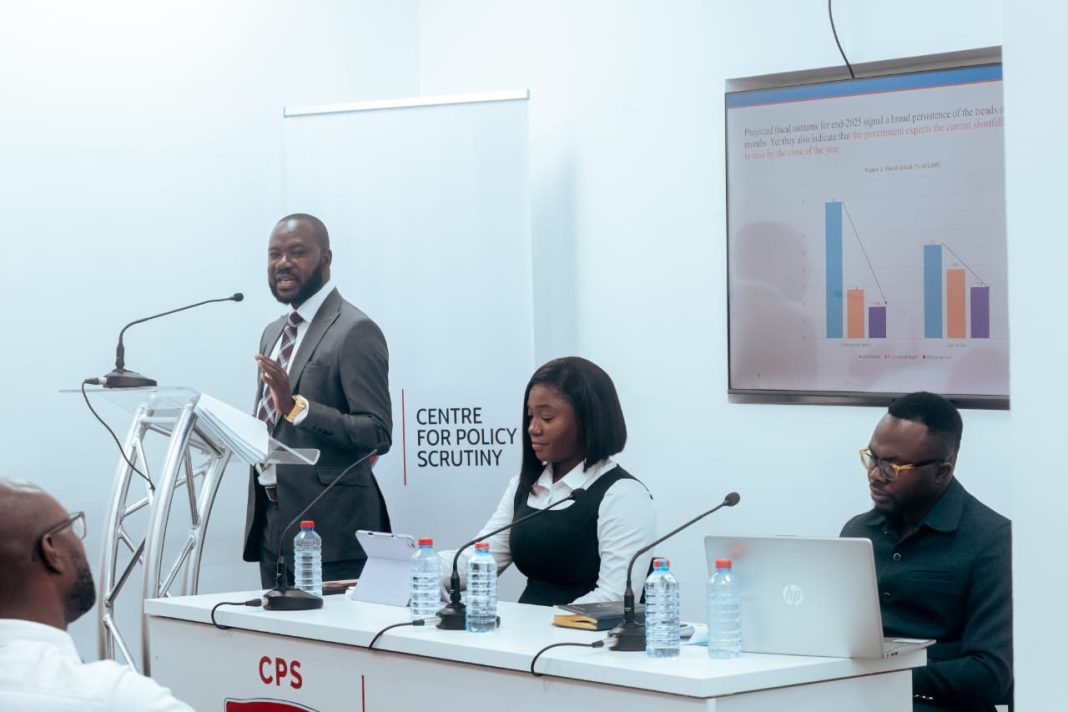The Centre for Policy Scrutiny (CPS) has raised serious concerns over the 2026 budget’s capital expenditure (CAPEX) plans, warning that the proposed 141 percent increase is highly ambitious and may be difficult to implement without jeopardizing fiscal stability.
Speaking at a media briefing on Thursday, November 20, 2025, CPS acknowledged that while the government has made progress in stabilizing inflation and lowering interest rates, the proposed CAPEX growth in 2026 could strain public finances if revenue projections are not fully realized.
“The government’s plan to increase capital spending by 141 percent is extremely ambitious,” said Executive Director, Dr. Adu Owusu Sarkodie. “Without credible financing strategies and effective project management, such an aggressive expansion risks fiscal slippage and may compromise the quality of investment outcomes.”
CPS’ review highlighted that the 2026 budget assumes significant growth in both internally generated funds and external financing to support the surge in CAPEX warning that reliance on projected revenues, especially given the challenges in tax collection and compliance, could leave the government exposed if actual receipts fall short.
“Capital expenditure is critical for growth, but its success depends on careful planning and realistic assumptions,” the review stated. “If the government overestimates its ability to mobilize resources, projects may face delays, underfunding, or incomplete execution, undermining the intended economic impact.”
CPS also pointed out that the proposed CAPEX increase appears to be front-loaded, focusing heavily on large infrastructure projects, including roads, housing, and energy investments. While these projects are necessary for long-term growth, the Center cautioned that accelerated disbursement without proper oversight could lead to inefficiencies and cost overruns.
Dr. Sarkodie emphasized the need for a balance between ambition and realism. “We support increased investment in infrastructure and development projects, but it must be done sustainably. Overambitious CAPEX plans, unsupported by realistic revenue and financing strategies, can erode fiscal credibility and limit the government’s capacity to respond to economic shocks.”
Despite these concerns, CPS acknowledged that the 2026 budget contains positive elements, such as targeted interventions to lower borrowing costs, support private sector growth, and create employment. Falling interest rates and disinflation trends, the Think Tank noted, provide a favorable environment for investment.
However, the Centre urged caution, stressing that the combination of high CAPEX growth and uncertain revenue targets could increase the fiscal deficit and pressure public debt levels. It is recommended that the government prioritize efficiency, transparency, and proper project management to ensure that CAPEX translates into tangible economic benefits.
CPS also encouraged the Ministry of Finance to implement robust monitoring and reporting mechanisms, particularly for externally financed projects, to reduce the risk of delays and mismanagement. Collaboration with civil society, development partners, and the private sector was also recommended to ensure accountability and maximize developmental impact.
